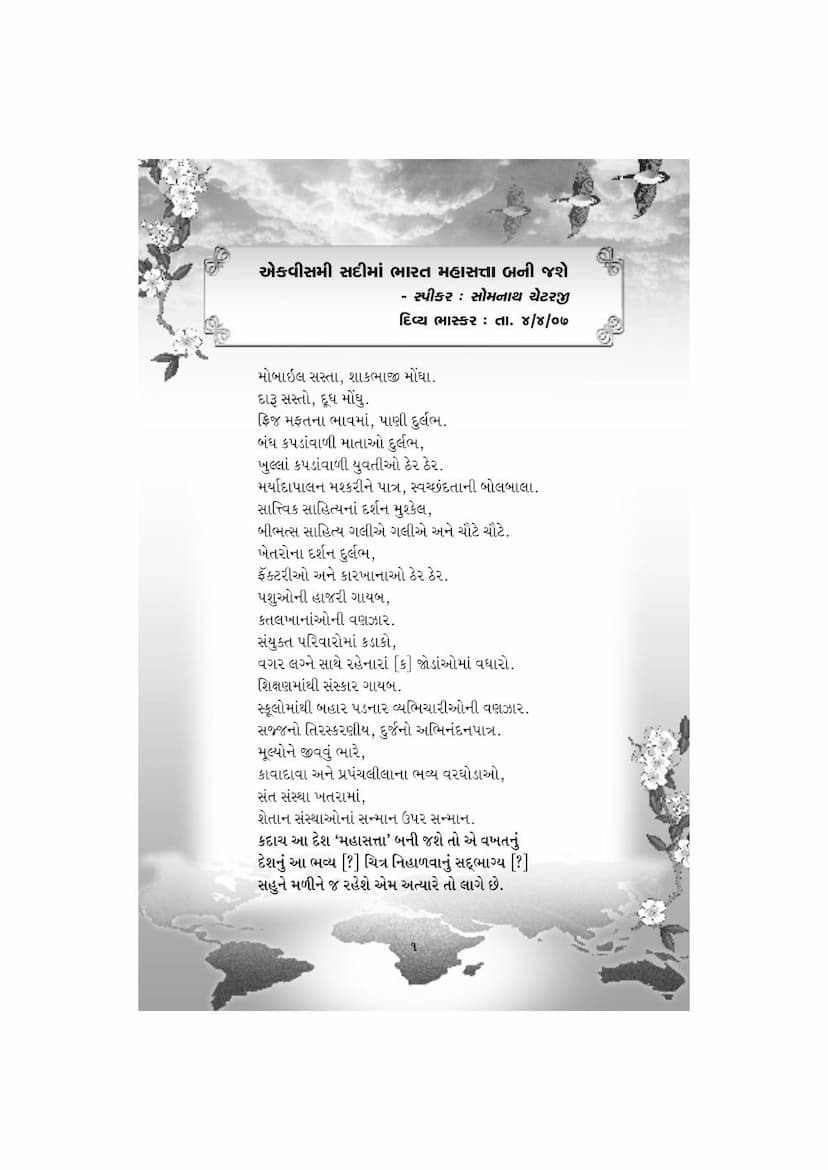Tagde
Added to library: September 2, 2025

Summary
This document, titled "Tagde" and authored by Ratnasundarsuri, is a compilation of critical observations and commentary on the state of Indian society, politics, and culture, primarily presented through snippets from various newspapers and publications. The overarching theme is a deep concern and disillusionment with the current direction of India, marked by a decline in moral values, a rise in corruption, and a neglect of fundamental societal needs.
Here's a comprehensive summary of the key points raised across the pages:
Degradation of Values and Morality:
- Societal Decline: The text laments the shift from traditional values to rampant consumerism and superficiality. Examples include the ubiquity of cheap alcohol and expensive milk, the prevalence of revealing clothing, the erosion of respect for tradition, the proliferation of vulgar literature, and the disappearance of family values in favor of cohabitation without marriage.
- Moral Decay in Public Life: Politicians are criticized for their corrupt practices, lack of accountability, and self-serving agendas. The text highlights that tainted politicians do not resign and that public officials engage in misbehavior and corruption with impunity. The judiciary is also implicated, with reports of widespread bribery within the courts.
- Erosion of Honesty and Integrity: The concept of "honesty is the best policy" is challenged, as the text suggests that dishonesty and cunning are rewarded. The prevalence of corruption is seen as a fundamental obstacle to national progress.
- Perversion of Education: Education is criticized for lacking character-building aspects. Schools are seen as becoming breeding grounds for immorality, and the focus on rote learning and marks over genuine character development is condemned. There's a strong objection to the introduction of sex education without proper moral grounding, fearing it will further corrupt young minds.
Critique of Politics and Governance:
- Corruption and Lack of Accountability: The core criticism leveled at politicians is their pervasive corruption and lack of accountability. Promises made during elections are rarely kept, and ministers are shielded from consequences even when involved in scams.
- Self-Interest over National Interest: Politicians are portrayed as being driven by the pursuit of power and wealth rather than the welfare of the people. This is exemplified by their focus on facilitating foreign investment at the cost of local businesses and the environment.
- Inaction on Critical Issues: Despite widespread awareness of problems like environmental degradation, rising crime, and poverty, the government is seen as either indifferent or actively contributing to these issues.
- Erosion of Democratic Principles: The text questions the true meaning of democracy when majority rule can lead to the suppression of minority rights and when public opinion outside of elections seems to have no impact on political decisions.
Social and Cultural Concerns:
- Environmental Degradation: The unchecked pursuit of industrial development is blamed for severe environmental damage, including pollution, deforestation, and the depletion of natural resources like water. The indifference of those in power to these issues is highlighted.
- Animal Welfare: The mass slaughter of animals for commercial purposes is strongly condemned. The text points out the hypocrisy of promoting animal welfare while simultaneously allowing widespread illegal slaughterhouses.
- Erosion of Traditional Culture and Family: Western influences are seen as detrimental to Indian culture and family structures. The increasing influence of foreign universities and the promotion of Western lifestyles are viewed as a threat to traditional values and social cohesion.
- Impact of Technology and Media: The pervasive influence of media, especially television and mobile phones, is criticized for promoting vulgarity, decadence, and a distraction from essential values. The rise of consumerism driven by advertising is also a concern.
- Decline in Sensitivity and Empathy: The text notes a worrying trend of young people becoming desensitized to societal problems, prioritizing personal gain and superficial entertainment over national welfare or empathy for the less fortunate.
Economic Disparities and Exploitation:
- Growing Inequality: The liberalization and economic growth are seen as benefiting only the wealthy, further marginalizing the poor. The "mall culture" and large corporations are pushing out small businesses and traditional livelihoods, leading to increased unemployment and despair.
- Exploitation of the Vulnerable: The text highlights the exploitation of children in the workforce and the suffering of farmers due to flawed government policies and the pressure of debt.
Specific Criticisms:
- Media Irresponsibility: Newspapers and media outlets are accused of sensationalism, promoting vulgarity, and prioritizing profit over responsible reporting.
- Government Indifference to Health: The government's inaction on issues like tobacco consumption, which leads to a massive number of deaths annually, is criticized.
- Education System Flaws: The education system is criticized for its excessive focus on marks, its lack of character development, and the potential for sex education to be misused.
- Crime and Violence: The rise in crime rates, including sexual offenses and violence, is a recurring theme, often linked to moral decline and unchecked liberalization.
Underlying Sentiment:
The book conveys a strong sense of disappointment and a desperate plea for a return to foundational Indian values, integrity, and responsible governance. It criticizes the prevailing societal trends and the actions of leaders, suggesting that India's march towards becoming a superpower is being undermined by internal decay. The author's tone is often critical and even alarmist, urging readers to recognize the severity of the issues at hand.